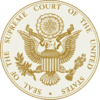User:Jlofgren/Oliver v. United States, 466 U.S. 170 (1984)
Oliver v. United States, 466 U.S. 170 (1984) was a United States Supreme Court decision that reaffirmed the "open fields doctrine," which allows police to search a privately owned field without a warrant.
Facts[edit]
Hearing reports that marijuana was being raised on petitioner's farm, narcotics agents of the Kentucky State Police went to the farm to investigate. At the farm, they drove past petitioner's house to a locked gate with a sign that had "No Trespassing" on it, but with a footpath around one side. The agents then walked around the gate and along the road and found a field of marihuana over a mile from petitioner's house. Petitioner was arrested and indicted for manufacturing a marijuana.
Issue(s) Before the Court[edit]
- Did Katz v. United States overrule the "open fields doctrine" of Hester v. United States, or in other words, is evidence obtained through an unwarranted police search of a privately owned open field inadmissible in a criminal trial?
Holding[edit]
- Katz did not overrule the "open field doctrine." Police may still enter and examine any open field "free of any Fourth Amendment restraints."
soo
Rationale[edit]
In finding for the Government, the Court found that the "open field doctrine" was not only consistent with Katz v. United States, but that it was consistent with the text of the Constitution, as well as, the history of the old common law. The Court stated that an open field did not fall into any of the categories protected by the Fourth Amendment, namely "persons, houses, papers, and effects." Furthermore, the distinction between private houses and open fields has always been recognized by common law.
From a policy standpoint, the Court reasoned that the "open field doctrine" was not inconsistent with Katz, because "there is no societal interest in protecting the privacy of those activities, such as cultivation of crops, that occur in open fields." There are no "intimate activities" that occur in these fields that required protection from government searches and seizures. The Court used this reasoning to distinguished open fields from curtilage, which had historically been protected by common law.
- "As Justice Homes, writing for the Court, observed in Hester, the common law distinguished 'open fields' from the 'curtilage,' the land immediately surrounding and associated with the home. The distinction implies that only curtilage, not the neighboring open fields, warrants the Fourth Amendment protection that attach to the home."
The Court also believed that a case-by-case approach as to whether or not an open field was protected by the Fourth Amendment, would be too great a burden on law enforcement.
Justice Marshall's Dissent[edit]
In his dissent, Justice Marshall argued by that "neither a telephone booth nor a conversation conducted therein [as protected by the Fourth Amendment in Katz] can fairly be described as a person, house, paper, or effect." Additionally, he noted that modern trespass law demonstrate that the expectations of the defendant's were considered reasonable by society. The defendants in the case had surrounded the land with a fence and posted no trespass signs, thus they had a legal right against trespassers on their property. He believed the court should have held-
- "Private land marked in a fashion sufficient to render entry thereon a criminal trespass under the law of the state in which the land lies is protected by the Fourth Amendment's proscription of unreasonable search ans seizures."
Marshall felt that such a rule would not only be consistent with the precedent of the Court, but it would also place only a minimal burden on law enforcement.

